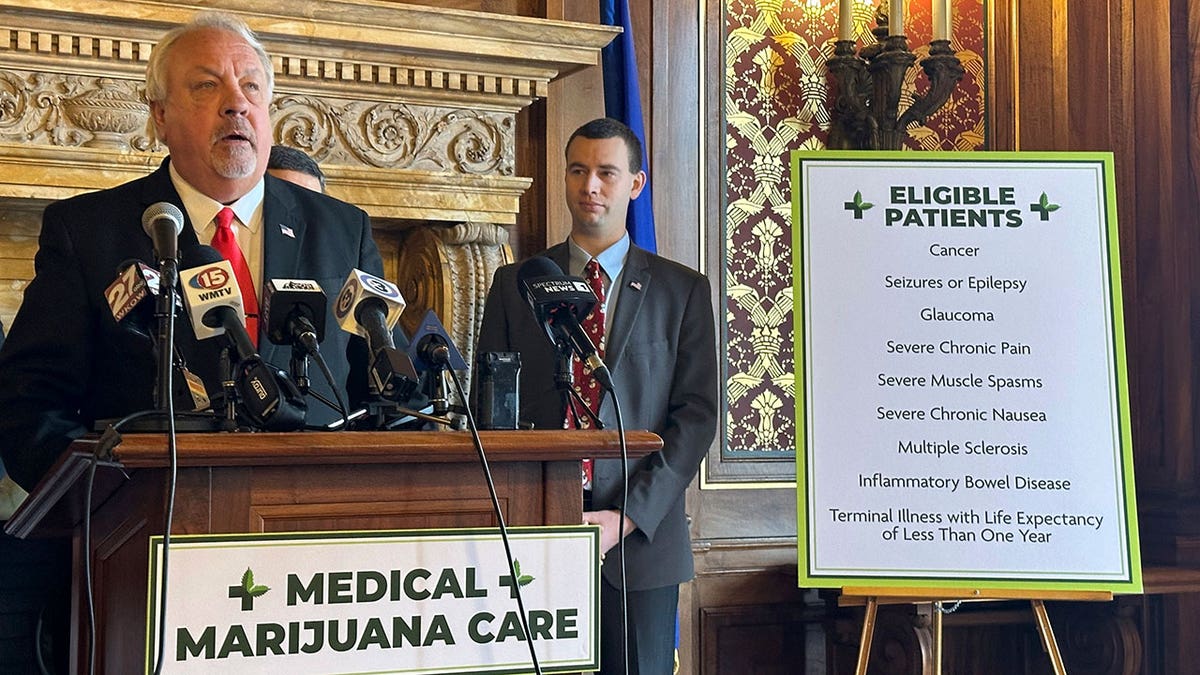Fox News Flash top headlines for January 8
Fox News Flash top headlines are here. Check out what's clicking on Foxnews.com.
- Wisconsin Republicans have proposed a plan to legalize medical marijuana in response to Democratic Gov. Tony Evers' recent support for the idea.
- The proposed bill restricts medical marijuana to severely ill individuals with chronic diseases like cancer.
- Republican Assembly Speaker Robin Vos said the presented program represents the maximum extent the group is willing to support.
Wisconsin Republicans on Monday unveiled a highly restricted plan to legalize medical marijuana in the state, a proposal years in the making that comes less than a week after Democratic Gov. Tony Evers voiced support for the idea.
The bill would limit medical marijuana only to severely ill people with chronic diseases such as cancer and is far from the full legalization that Evers and Democrats have pushed unsuccessfully to pass for years. Still, Evers said last week that he supports creating a medical marijuana program if that's all that can be done now.
Republican Assembly Speaker Robin Vos has said that the program detailed in the bill announced Monday was as far as Assembly Republicans could go. Republicans hold a 64-35 majority in the Assembly and a 22-11 advantage in the Senate. Last year, Republican Senate Majority Leader Devin LeMahieu said a bill to create a medical marijuana program could pass this legislative session — as long as regulations are put forward to ensure that it would be limited to only those who are in serious pain.
WISCONSIN GOV. EVERS TO CONSIDER MEDICAL MARIJUANA LEGALIZATION PROPOSAL BY REPUBLICANS
The bill unveiled Monday would limit the availability of marijuana to people diagnosed with certain diseases, including cancer, glaucoma, multiple sclerosis, inflammatory bowel disease, severe muscle spasms, chronic pain or nausea, and those with a terminal illness and less than a year to live.

Republican Rep. Jon Plumer unveils a GOP proposal to legalize medical marijuana in Wisconsin at a Capitol news conference on Jan. 8, 2024, in Madison, Wis. Wisconsin Republicans on Monday unveiled a highly restricted plan to legalize medical marijuana in the state. (AP Photo/Scott Bauer)
Patients would be required to have a doctor's diagnosis to obtain the marijuana at one of only five state-run dispensaries. The number of dispensaries could grow, said Republican Rep. Jon Plumer at a news conference.
"We want to make this available to people, but we want to have tight controls on it as well," Plumer said.
Recreational marijuana is legal in neighboring Minnesota, Illinois and Michigan.
Vos said it was modeled after the medical marijuana law that was in place in Minnesota before it moved to full legalization.
The bill would have to clear the Assembly and Senate and be signed by Evers before it could take effect.
Evers and LeMahieu did not respond to requests for comments on the measure.
In a potential warning sign for the measure's chances in the Senate, Assembly Republicans created their plan without the involvement of Republican Sen. Mary Felzkowski, who has been the biggest proponent for medical marijuana legalization in the Senate. A bill she introduced in 2022 is the only one to ever get a public hearing in the Legislature.
WISCONSIN CONSULTANTS HIRED TO REDRAW GOP-DRAWN LEGISLATIVE MAPS FOLLOWING COURT RULING
Evers said last week in voicing support for the concept that he had not seen an actual bill.
"I would think that getting it all done in one fell swoop would be more thoughtful as far as meeting the needs of Wisconsinites that have asked for it," Evers said. "But if that’s what we can accomplish right now, I’ll be supportive of that."
Wisconsin remains an outlier nationally. Thirty-eight states have legalized medical marijuana and 24 have legalized recreational marijuana. The push for legalization in Wisconsin has gained momentum as its neighbors have loosened their laws.
Marquette University Law School polls have shown large majority of Wisconsin residents have supported legalizing marijuana use for years.













































